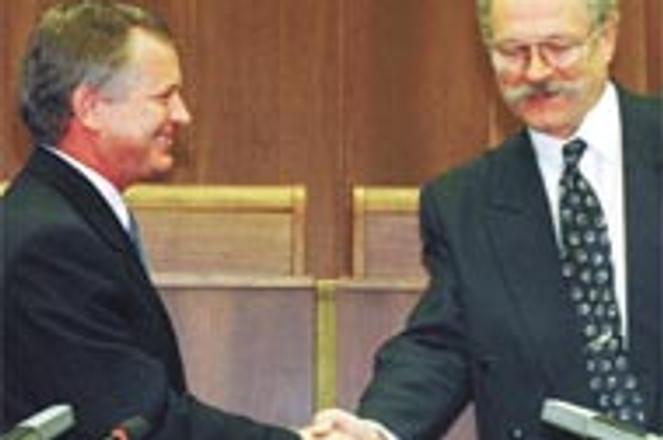Big shoes to fill. Jozef Migaš, the new speaker of the Slovak parliament, accepts a handshake from outgoing speaker Ivan Gašparovič.TASR
For four hours on November 3, the Slovak parliament was deadlocked by the refusal of opposition party deputies to declare themselves present for voting. The situation was an embarrassment for the country's new governing parties, who in their second day in parliament had omitted to ensure that enough of their own deputies would be qualified to take part in house debates.
Slovakia's house of Parliament has 150 seats, and at least 76 deputies must declare themselves present for parliamentary sessions to commence. But on November 3, the government was hoping to swear in replacements for those 21 deputies who had taken government posts and thus given up their parliamentary seats.
Although the new ruling coalition has 93 seats in the house, the formation of the government had left the four-member coalition temporarily short 21 seats, and able to produce only 72 votes, insufficient to swear in the replacements. And although 56 opposition deputies were actually present in the house, they gleefully refused to sign in, blocking the session for four hours until the far-right SNS party relented and voted to have the replacements belatedly sworn in.
"It was an unmanageable situation, because the new ruling coalition was so excited about the process of democratization that they forgot to fill parliament with replacements [for government and ministry officials] so they would have enough deputies to vote," said Ján Cuper, legal expert for the opposition HZDS party of former Premier Vladimír Mečiar.
During the deadlock, the government grew desperate enough to consider a plan involving the dismissals of one minister and three ministry state secretaries, who would then return to parliament as voting deputies and assist the government in swearing in the replacement deputies. In the end, however, the idea was dismissed as too complicated and time consuming.
Vladimír Palko, parliamentary Vice-Chairman for the ruling SDK party, stated that the ruling coalition was trying to move things forward and rejected such tactics as blocking voting out of spite. "Some opposition deputies just sat in the parliament, but did not sign in for the vote, just to block the replacement of the ministers and state secretaries," he said. "This way of thinking is totally strange for us."
The session re-opened after a four-hour break, at which point the opposition demanded that the new parliamentary speaker, Jozef Migaš of the reformed communist SDĽ party, be recalled for making repeated mistakes in calling the order of debate. "If the parliamentary speaker had acted according to debating procedure, parliamentary debate would not have been blocked," said Miroslav Maxon, HZDS deputy and ex-Finance Minister. "I counted five mistakes in the debate procedure," Maxon insisted, but did not explain how Migaš' failings were connected to the four hour stand-off.
After the shorthand record of the debate verified that parliamentary rules had not been broken, the session went on under Migaš's leadership. "I don't think it was something exceptional," opined Ivan Šimko, legal expert of the SDK. "The law wasn't broken, and sometimes it's good to learn on the job," Šimko said of Migaš's sometimes bewildered managing of the debate.
At various times, Migaš called for a vote on a proposal ascribed to the wrong deputy, refused to recognise the remarks of several opposition deputies and appeared to lose track of what was to be discussed. Migaš, who has never before served in parliament even as a deputy, sat red-faced as cat-calls flew from guffawing opposition deputies. Even Šimko raised a ribald cheer when he corrected one of Migaš's more egregious blunders.
"Migaš did not make such mistakes that he should have been forced to hand the house leadership over to his deputy," said Ľubomír Fogaš, Vice-Premier for Legislation from Migaš's SDĽ party.
But the opposition was unrelenting in its criticism of Migaš and the government coalition for its lack of both preparation for and confidence in its handling parliamentary procedure. "The current ruling powers led this country into a constitutional crisis," insisted Vojtech Tkáč, HZDS deputy and ex-Minister of Labour and Social Affairs.
"We're sorry that they didn't drink their cup to the dregs, and that SNS supported them in the end," said the HZDS's Cuper after the session was closed for the night. The HZDS declared after its defeat in September's national elections that it would form a "constructive opposition" with the SNS.
The unusual parliamentary session prvented the ruling coalition from fulfiliing its aims, which had been to modify the Slovak constitution by a constitutional law and amend the law on municipal elections (see story, this page).
Additional reporting by Slavomír Danko

